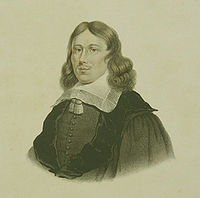
Frans van Schooten
Encyclopedia

Netherlands
The Netherlands is a constituent country of the Kingdom of the Netherlands, located mainly in North-West Europe and with several islands in the Caribbean. Mainland Netherlands borders the North Sea to the north and west, Belgium to the south, and Germany to the east, and shares maritime borders...
mathematician
Mathematician
A mathematician is a person whose primary area of study is the field of mathematics. Mathematicians are concerned with quantity, structure, space, and change....
who is most known for popularizing the analytic geometry
Analytic geometry
Analytic geometry, or analytical geometry has two different meanings in mathematics. The modern and advanced meaning refers to the geometry of analytic varieties...
of René Descartes
René Descartes
René Descartes ; was a French philosopher and writer who spent most of his adult life in the Dutch Republic. He has been dubbed the 'Father of Modern Philosophy', and much subsequent Western philosophy is a response to his writings, which are studied closely to this day...
.
Life
Van Schooten's father was a professor of mathematics at Leiden, having Christiaan Huygens, Johann van Waveren HuddeJohann van Waveren Hudde
Johannes Hudde was a burgomaster of Amsterdam between 1672 – 1703, a mathematician and governor of the Dutch East India Company....
, and René de Sluze as students.
Van Schooten read Descartes' Géométrie (an appendix to his Discours de la méthode) while it was still unpublished. Finding it hard to understand, he went to France to study the works of other important mathematicians of his time, such as François Viète
François Viète
François Viète , Seigneur de la Bigotière, was a French mathematician whose work on new algebra was an important step towards modern algebra, due to its innovative use of letters as parameters in equations...
and Pierre de Fermat
Pierre de Fermat
Pierre de Fermat was a French lawyer at the Parlement of Toulouse, France, and an amateur mathematician who is given credit for early developments that led to infinitesimal calculus, including his adequality...
. When Frans van Schooten returned to his home in Leiden in 1646, he inherited his father's position and one of his most important pupils, Huygens.
Works
Van Schooten's 1649 Latin translation of and commentary on Descartes' Géométrie was valuable in that it made the work comprensible to the broader mathematical community, and thus was responsible for the spread of analytic geometry to the world. Over the next decade he enlisted the aid of other mathematicians of the time, de BeauneFlorimond de Beaune
Florimond de Beaune was a French mathematician. He was a friend of René Descartes, and later wrote Notes brièves, the first important introduction to Descartes' analytic geometry....
, Hudde, Heuraet
Hendrik van Heuraet
Hendrik van Heuraet was a Dutch mathematician. He was noted as one of the founders of the integral. From [1653 he studied at Leiden University where he interacted with Frans van Schooten, Johannes Hudde, and Christiaan Huygens. In 1658 he and Hudde left for Saumur in France. He returned to Leiden...
, de Witt
Johan de Witt
Johan de Witt, heer van Zuid- en Noord-Linschoten, Snelrewaard, Hekendorp and IJsselveere was a key figure in Dutch politics in the mid 17th century, when its flourishing sea trade in a period of globalization made the United Provinces a leading European power during the Dutch Golden Age...
and expanded the commentaries to two volumes, published in 1659 and 1661. This edition and its extensive commentaries was far more influential than the 1649 edition. It was this edition that Gottfried Leibniz
Gottfried Leibniz
Gottfried Wilhelm Leibniz was a German philosopher and mathematician. He wrote in different languages, primarily in Latin , French and German ....
and Isaac Newton
Isaac Newton
Sir Isaac Newton PRS was an English physicist, mathematician, astronomer, natural philosopher, alchemist, and theologian, who has been "considered by many to be the greatest and most influential scientist who ever lived."...
knew.
Van Schooten was one of the first to suggest, in exercises published in 1657, that these ideas be extended to three-dimensional space. Van Schooten's efforts also made Leiden the centre of the mathematical community for a short period in the middle of the seventeenth century.

